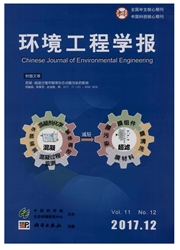

 中文摘要:
中文摘要:
高浓度DOP有机化工废水生物毒性强,采用常规处理手段难完全降解,对环境存在较高危害性。采用微絮凝-反渗透耦合过程对DOP化工厂二级生化出水进行深度处理研究,考察了絮凝预处理的最佳条件,比较了BW30和CPA2两种反渗透复合膜对该实际废水的处理性能,并利用电子扫描电镜分析了废水处理过程中膜表面结构的变化。结果表明:絮凝预处理可有效去除废水中的大部分浊度和部分COD,为反渗透处理提供良好的进水水质。反渗透过程不仅可有效去除废水中的盐类和COD,而且出水水质大大提高。2种膜的最终出水浊度均为0,COD分别为5.9和32.0 mg/L,Cl-分别为35.25和150.16 mg/L,完全达到了作为循环冷却补充水的回用水水质要求。
 英文摘要:
英文摘要:
High concentration organic wastewater of dioctyl phthalate(DOP)is very difficult to be degraded completely by conventional treatments and leads to serious harmful to the environment due to its strong biological toxicity.In this paper,reverse osmosis(RO) coupling with micro-coagulation was used in advanced treatment of secondary effluent from DOP chemical plant for reutilization.To prevent membrane fouling effectively,the optimal operating conditions for micro-coagulation process were investigated firstly.Performance of two different kinds of composite RO membranes(BW30,CPA2) was compared and the membrane structure variation in wastewater treatment was also analyzed by SEM.Results showed that micro-coagulation pre-treatment had good performance on removal of turbidity and COD,which could guarantee good quality of feed water for RO.RO membranes held good performance on desalination and COD,also the water quality was greatly improved.The turbidity of permeate was 0 for both RO membranes.The permeate from RO held low COD value of 5.9 and 32.0 mg/L,and low chloride content of 35.25 and 150.16 mg/L for each RO membrane respectively,and could be reused as cooling water in chemical industry.
 同期刊论文项目
同期刊论文项目
 同项目期刊论文
同项目期刊论文
 Physicochemical characteristics of hollow fiber structured packings in isopropanol/water distillatio
Physicochemical characteristics of hollow fiber structured packings in isopropanol/water distillatio Chemically modification of polysulfone membrane by polyethylene glycol for resisting drug adsorption
Chemically modification of polysulfone membrane by polyethylene glycol for resisting drug adsorption Producing cell-free culture broth of rhamnolipids as a cost-effective fungicide against plant pathog
Producing cell-free culture broth of rhamnolipids as a cost-effective fungicide against plant pathog Highly Active S-Modified ZnFe2O4 Heterogeneous Catalyst and Its Photo-Fenton Behavior under UV-Visib
Highly Active S-Modified ZnFe2O4 Heterogeneous Catalyst and Its Photo-Fenton Behavior under UV-Visib Preparation of Nitrogen-Modified Titania with Urea as Nitrogen Source and Its Modification Mechanism
Preparation of Nitrogen-Modified Titania with Urea as Nitrogen Source and Its Modification Mechanism Fouling mechanism of low-pressure hollow fiber membranes used in separating nanosized photocatalysts
Fouling mechanism of low-pressure hollow fiber membranes used in separating nanosized photocatalysts 期刊信息
期刊信息
